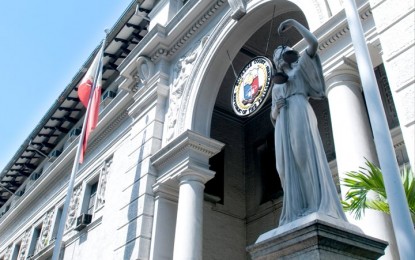
(Photo courtesy of SC)
MANILA – The Supreme Court (SC) on Monday announced that oral arguments on petitions questioning Republic Act No. 11479, or the Anti-Terrorism Act (ATA), will resume on April 6 after concerns were raised over the rising number of coronavirus disease 2019 (Covid-19) cases.
In a notice, Clerk of Court Edgar O. Aricheta said that "due to the alarming increase of Covid cases, the court has ordered the suspension of the continuation of the oral arguments set for March 23."
The Department of Health reported 8,019 new cases and 103 recoveries on Monday.
The fifth day of oral arguments was to hear the opinions of former Chief Justice Reynato Puno and former Solicitor General Francis Jardeleza.
Puno and Jardeleza have been designated by the Court as amici curiae (friends of the court).
Solicitor General Jose Calida, representing the government, has yet to be heard, too.
A total of 37 petitions were filed questioning RA No. 11479, signed by President Rodrigo Duterte on July 3, 2020.
During the previous oral argument on March 2, Associate Justice Edgardo delos Santos said terrorist attacks over the years have chilling effects on survivors and witnesses.
Delos Santos issued a reaction after petitioners during the fourth day of interpellation claimed that the law has a chilling effect on the rights of the petitioners.
Delos Santos interpellated former Bayan Muna partylist representative Neri Colmenares on the so-called chilling effect of the legislation.
“Do you mean to say you fear the passage of the law? The law has its chilling effect on the rights of petitioners. How about those from Metro Manila and the nearby places? Can the chilling effect be quantified?” he asked.
Citing figures earlier cited by Associate Justice Amy Lazaro-Javier, delos Santos asked Colmenares for his comment in connection with the 78 documented bombings in Mindanao since 1971, which he said resulted in “hundreds if not thousands of victims including children, pregnant women, elderly or old people who are either maimed beyond recognition and died or decapitated, dismembered or severely injured”.
“I think you will agree with me that this gruesome picture of violence and death has a chilling effect on the survivors and witnesses of the senseless bombings,” delos Santos said.
Colmenares insisted that intelligence work would suffice.
For his part, Associate Justice Ricardo Rosario questioned the petitioners’ insistence that police work without the new law, mentioning the September 11, 2001 bombings in the United States.
“The way I see it, terrorism is a much complex crime requiring as it does, some elaborate planning precision timing, perfect execution, and a vast network of conduits and accomplices to carry out,” he said.
Rosario said terrorism is nothing compared to common crimes as murder, theft, or robbery.
“A fine example is the 9/11 attack which, from media accounts, was successfully launched because of the painstaking planning and the commitment of the perpetrators. Given the terrorist’s commitment to succeed and considering the elaborate planning and furtiveness in the preparation and execution and the damage that it causes don’t you think the authorities should be given somewhat more slack in dealing with it?” he said.
He said terrorism is not a simple conspiracy that can be discovered overnight or with little time at all, “like in other common crimes and where conspirators are brought to justice because of some timely sleuthing skills”. (PNA)
